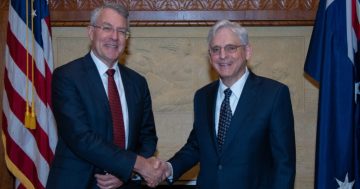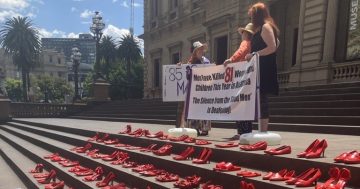
Attorney-General Mark Dreyfus has announced a review of the National Legal Assistance Partnership. Photo: Anna Carlisle.
Overburdened legal aid centres across the country will be hoping the latest review of government funding arrangements delivers on their promises to ensure all Australians have equal access to the law.
Don’t hold your breath. Funding is never enough, as any legal aid lawyer will tell you.
Federal Attorney-General Mark Dreyfus last week announced an independent review of the National Legal Assistance Partnership, a funding agreement between all Australian governments to provide the most vulnerable access to legal assistance for civil matters, such as family law disputes and child protection.
State and territory governments fund most criminal law matters.
A decade or more of chronic underfunding by all governments for legal aid services has recently forced Aboriginal legal aid services in NSW and Queensland to suspend services.
The National Aboriginal and Torres Strait Islander Legal Service (NATILS) says demand for legal services has risen 100 per cent since 2018, but federal government core funding has declined in real terms.
An emergency injection of $21 million in federal government funding in May would “do little more than help keep the lights on”, NATILS said.
“We fully expect service freezes to continue and that means bad outcomes for Aboriginal and Torres Strait Islander Australians, including unjust incarceration and separated families,” NATILS chair Karly Warner said.
The ACT Government has just delivered a $2 million boost for community legal services in the budget, including for the NSW/ACT Aboriginal Legal Service, which Ms Warner leads. In the ACT, its services continue.
A longer-term boost to national funding for legal aid services is at least another year away.
The current national funding agreement is due to expire in 2025. Since 2020, it will have delivered $2.4 billion in federal funding to legal services around the country.
Mr Dreyfus has promised its review will be finished by early 2024.
He’s appointed Canberra-based Warren Mundy, a former Productivity Commissioner, who led a “landmark” public inquiry into access to justice in 2014. Its findings have “largely been ignored”, according to Mr Dreyfus.
Dr Mundy’s 2014 inquiry found that providing legal assistance to individuals with civil legal problems delivered benefits to the wider community because it helps prevent civil disputes from escalating and reduces the burden on the courts and other government services.
ACT Legal Aid CEO John Boersig is enthusiastic about Dr Mundy’s appointment.
“It’s an excellent appointment. He’s highly experienced and already understands the sector, not just legal aid, but community legal services, Aboriginal legal services, and family violence prevention services,” he said.
Legal Aid ACT represents about 3000 people in court every year, Mr Boersig said, although it provides a much wider range of legal assistance.
“We touch in one way or another around 40,000 people every year,” he said.
“That’s for a whole range of services such as duty work, health, justice, partnerships, we’re in each of the colleges in the ACT, we’re running an older person service, a youth service, and then we have the very large criminal family and civil practices.”
Crime makes up about 30 per cent of the work and is largely funded by the ACT Government, Mr Boersig explained.
Civil and family law is where “the burgeoning need keeps coming”, accounting for about 70 per cent of Legal Aid ACT’s caseload.
“People are having problems with debt and recovery, and NDIS. Protections around family violence and family law are growing areas. Crime has remained pretty steady,” he said.
“We have a very strong family violence practice,” he said. Of every 100 cases, “95 will be related to family violence”.
What’s important about the regular review of national legal assistance funding “is that they establish the financial basis for the investment by government in civil society”.
“Legal aid is all about ensuring people have equal access to the law. And I’m hoping that’s what the major finding will be.”
– Deb Nesbitt is a long-term Canberra resident who is deeply curious about nearly everything. With many decades of reporting experience (including for Thomson Reuters and the ABC), Deb now writes on a freelance basis for numerous news outlets, including Bloomberg Law.
Original Article published by Deb Nesbitt on Riotact.










